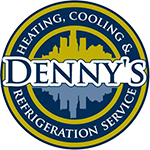Denny's Heating, Cooling & Refrigeration
Quality Heating, Cooling & Refrigeration
Denny's Heating & Cooling has served metro Detroit for 35 years and has established a reputation for fair dealing and competence. Family owned and operated, we feel a handshake is as important as a written proposal.
Honesty, integrity and "going the extra mile" are at the heart and soul of our company.
Contact Us




